Robert Trevino, new Principal Guest Conductor of the RAI Torino

Trevino will be the Principal Guest Conductor of the RAI National Symphony Orchestra, a highly prestigious orchestra in Italy, work that he will combine with his position in the Basque National Orchestra.
Starting with the 2021/2022 Season, the Chief Conductor of the Basque National Orchestra, Robert Trevino, will take on a new responsibility in his music career. Trevino will be the Principal Guest Conductor of the RAI National Symphony Orchestra, also popularly known as the RAI Torino. It is a highly prestigious orchestra in Italy, very well known for its many international tours and for the quality of its chief and guest conductors.
Starting with this new appointment, Robert Trevino will manage, with different levels of responsibility, the following orchestras: The Basque National Orchestra as Chief Conductor, the RAI Torino as Principal Guest Conductor and the Malmö Symphony Orchestra as Artistic Advisor.
His new responsibility at the RAI Torino includes, along with his presence during the concert season, several international tours and recordings.
For the Basque National Orchestra the new appointment of Trevino means recognition of the work it has been carrying out during recent years with its Chief Conductor, and which will continue in the future, and undoubtedly raises the profile of the orchestra at international level.
More information
Orchestra Sinfonica Nazionale della RAIIn their first joint record, the Basque National Orchestra and Robert Trevino present the most universal of Basque composers: Ravel
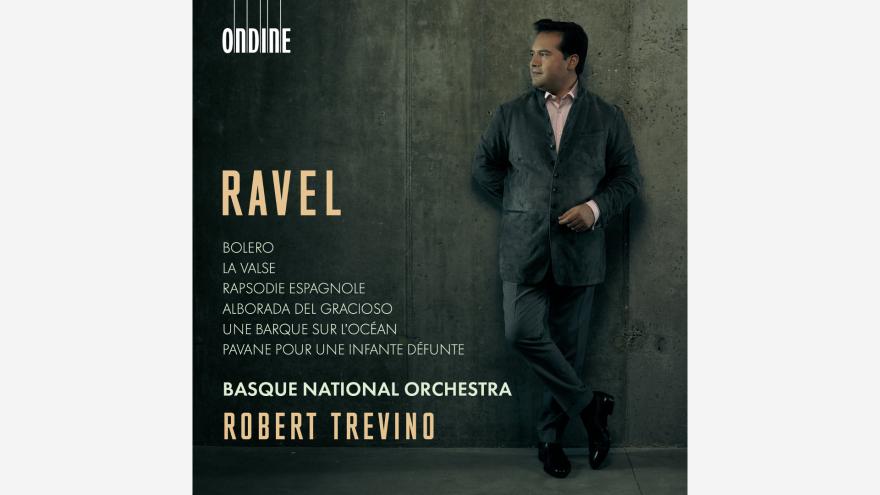
Launched internationally just a few days ago with Ondine Records, this eagerly-awaited and demanding recording of Ravel's orchestral works has been on the cards for some time.
Maurice Ravel is a universal composer whose works are performed across the world. Born in Ziburu in the French Basque Country, the Basque National Orchestra is showcasing his Basque origins. Robert Trevino has conducted centrepiece performances of Ravel in several season concerts and in the orchestra’s debut at the Théâtre des Champs-Élysées in Paris. Since the early days of his conductorship, Trevino has been keen to explore Ravel's Basque identity in depth and to share with the world what this orchestra knows and understands about the composer’s language.
In Trevino's own words, ‘For the Basque National Orchestra, recording an album solely of Ravel is a huge challenge because the public knows this repertoire extremely well. It has been recorded countless times and performed to an excellent standard throughout history. So (…) why is this necessary? I think it is important to recognise the great affinity that the Basque National Orchestra has with the music of Maurice Ravel’.
The result of this time in the studio is an eagerly-awaited orchestral album of Ravel. As for the renewed interest in the composer, the music itself gives the clues, as Trevino explains. ‘There are many passages in Ravel's music which are particularly Basque, such as rhythms or popular phrases, hidden all throughout his work. Ravel was French-Basque. Though his music has a lot of French colour, it also has Basque frankness and determination. In immersing ourselves in his music and approaching this masterful composer from a new direction, we have uncovered truths which are perhaps less evident to non-Basque orchestras. It has been a magnificent experience’.
This is the first time that Trevino has recorded Ravel but not so for the Basque National Orchestra. Its discography includes another album of Ravel recorded in 2000 with its then conductor Gilbert Varga and the pianist Joaquín Achúcarro from Bilbao. The record included Ravel's two piano concertos performed by Achúcarro along with Alborada del gracioso, which also features on the latest album together with La Valse, Boléro, Rapsodie espagnole, Pavane pour une infante défunte and Une barque sur l´océan.
Recording took place last October in the Kursaal Auditorium, where the large stage was equipped with an additional platform to ensure that the near 90 musicians tackling Ravel’s great orchestral works maintained the safety distances currently required.
Initial international reception
Available on CD and in digital format on large platforms such as Spotify, Amazon and Apple Music, this new Ravel is a compendium of works famous across the world. A dedicated album of Ravel in this day and age may be a tough sell, but the new approach by the orchestra and its conductor in this recording has already attracted the attention of the leading platforms in this market just a few days following its international launch, and the album ranks highly.
Some of the initial reactions are listed below:
- On Spotify, the album features on the list of Very best classical new releases.
- The prestigious magazine Gramophone has included the record on its Apple Music playlist of Essential new albums of the week.
- On Apple Music, Pavane pour une infante défunte is at the top of the A-List: Classical.
- Australian publication Limelight has named the disc its album of the month.
About Ondine Records
This record was made by the prestigious Finnish label Ondine. Trevino has an annual deal with the label that started with the recording of Beethoven’s complete symphonies with the Malmö Symphony Orchestra, of which he is also chief conductor. His recording career with the Basque National Orchestra kicked off afterwards with two albums: Ravel's most orchestral works, and a record of little-known American composers made last September.
Ondine, part of the Naxos group, is one of the most prestigious independent labels worldwide and has worked regularly with other prominent conductors including Christoph Eschenbach, Vladimir Ashkenazy, Esa-Pekka Salonen and Hannu Lintu.
‘Ondine selects artists with whom we can work with meticulously’, says Reijo Kiilunen, founding director of the label. ‘We try to limit ourselves to a few great artists who provide visionary and imaginative interpretations of the standard repertoire, and whose adventurous minds unearth lesser-known and fascinating musical discoveries. Robert Trevino ticks all these boxes; this is a conductor with immense musical prowess and an original and inquisitive mind.
Reijo Kiilunen continues: ‘Robert Trevino and the Basque National Orchestra have a highly characteristic and distinctive approach, and a fabulous sound. I was fascinated by the idea that this American conductor would guide the orchestra through the music of a Basque genius. This first record is a genuine revelation of just how wonderfully the orchestra with Trevino at the helm interprets the music of Maurice Ravel. The initial international reception has been enthusiastic and we expect excellent reviews. I congratulate the orchestra and Trevino for this impressive start and I eagerly await their future albums together’.
Where to buy the record
The record is available on the main digital platforms including Spotify, Apple Music, iTunes and many more.
Physical copies are also available to buy in several stores.
Basque National Orchestra opens the selection process for concertmaster
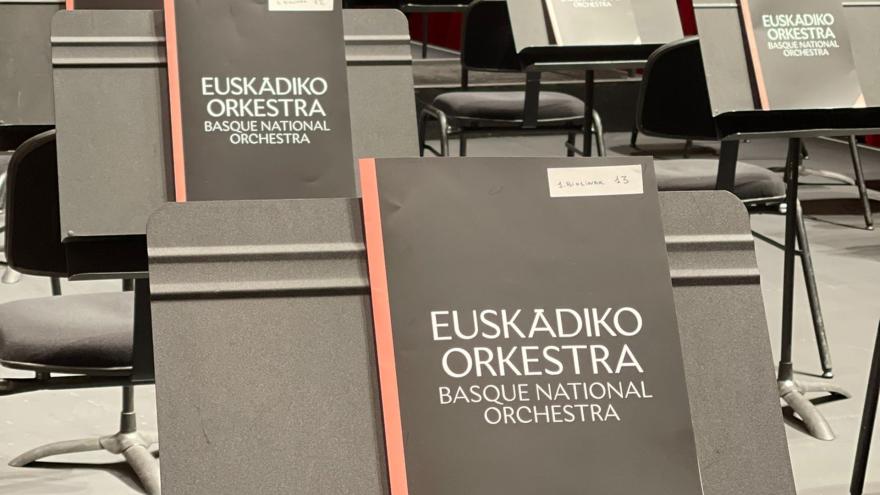
This position is in addition to those already announced for two tutti violins and a tutti French horn.
The Basque National Orchestra has opened the selection process for the position of concertmaster. It is an important position in a symphony orchestra as it is the soloist position in the first violin section. The selection process is open and applications must be made before 9 June. The selection process will take place on 10 and 11 August.
This selection process is in addition to those already open for a tutti French horn and two tutti violins, whose application deadlines are set for 13 and 14 May, respectively. The process to fill these vacancies will take place on 1 and 2 June for the two tutti violins and on 3 June for the tutti French horn position.
All the information, terms and conditions and application form for the three positions are available on the orchestra's website.
More information
Working for the orchestraThe Basque National Orchestra will perform Mahler's 'Fourth Symphony' under the baton of the great Semyon Bychkov at the Musika-Música Festival
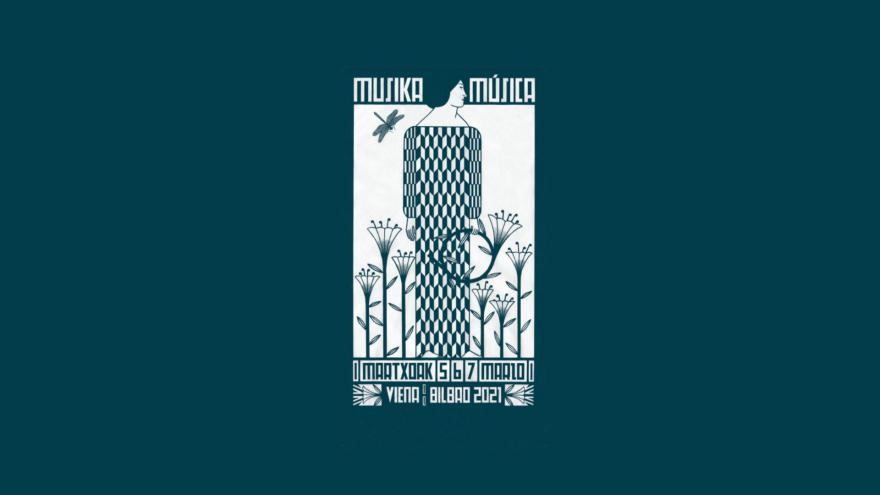
Serena Sáenz will take the role of soprano in this concert which will be held on 6 March at the Euskalduna Conference Centre, at 19:30.
Mozart, Beethoven, Schubert, Haydn, Brahms and Mahler, among other composers, will be performed in 36 concerts from 5 to 7 March at the 20th edition of this festival in Bilbao.
As usual, this year the Basque National Orchestra will also participate in Bilbao's Musika-Música Festival, in what will be its 20th edition. During these two decades the Festival has brought an abundance of music to Bilbao, and as a result has become a reference among music-lovers from all over the world.
Bilbao City Council has scheduled 36 concerts for the festival, which will be held this year from 5 to 7 March. The city of Vienna, the capital of music par excellence, has been chosen as the main feature of this edition, closing the cycle that began in 2019 with London and New York, and Paris in 2020. Bilbao will emulate Vienna and during the first weekend of March will become the capital of music. Its greatest exponents ‒ Mozart, Beethoven, Schubert, Haydn, Brahms or Mahler, among others ‒ will be ‘present’ in the city for three days, celebrating music.
The Basque National Orchestra will offer one of the Festival's unmissable events on Saturday 6 March at 19:30, in the Euskalduna Conference Centre. Under the orders of acclaimed director Semyon Bychkov and accompanied by soprano Serena Sáenz, the orchestra will perform Symphony no.4 by Gustav Mahler.
Prior to that, on Friday 5 March, the Basque National Orchestra will have performed a double concert within the same programme as part of its Subscription Season in the Baluarte Auditorium at 18:00 and tat 20:15.
Bychkov recently took the Basque National Orchestra podium, in August 2020, to direct Symphony No. 3, Eroica by Beethoven, at both the San Sebastián Musical Fortnight and the Santander Festival. After experiencing a great rapport between the director and the orchestra, Bychkov will repeat months later as the director of the Basque National Orchestra.
More information and ticket sales
Tickets will be numbered and will be for sale, for 6 to 12 euros, on Wednesday 24 February, at the Euskalduna Conference Centre ticket booths and on its website, as well as at Kutxabank multi-service ATMs and at the concert halls, half an hour before the start of each performance.
The organisation of the Festival will strictly comply with the health regulations in place as a result of Covid-19 in order to guarantee the safety of the artists and the public.
All the information about the festival and its 36 events can be found here.
Garikoitz Mendizabal and the Basque National Orchestra come together for 'Gutizia'
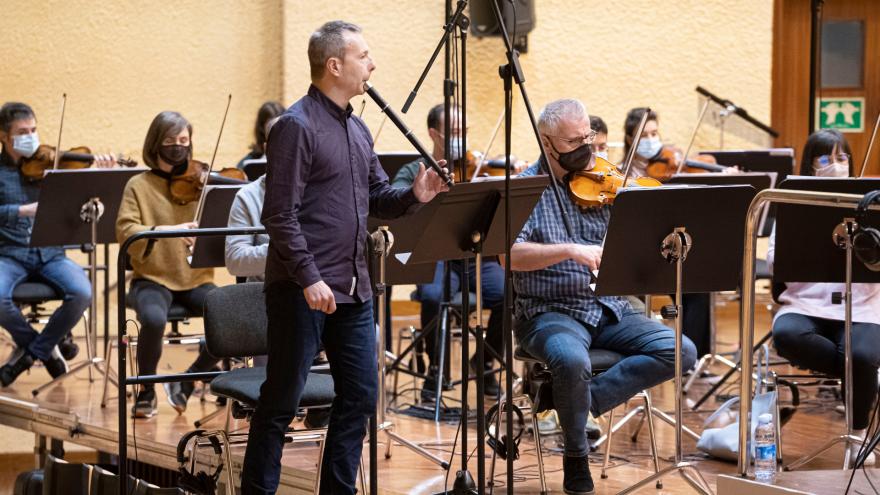
The txistulari (txistu player) Garikoitz Mendizabal and the Basque National Orchestra join forces to record eight works for txistu and orchestra composed by authors of diverse origins. Through their alliance, they hope to broaden the repertoire for this instrument and boost its international audience.
Two worlds which, on the face of it, are completely unrelated, have come together to produce Gutizia – a smorgasbord that directly links the txistu, an instrument deeply rooted in Basque culture, with a symphony orchestra. This is what's currently occupying Garikoitz Mendizabal and the Basque National Orchestra in Miramon, as they prepare to record and promote a compendium of works for txistu and orchestra. In the words of Garikoitz Mendizabal, one of the proponents of this instrument, the goal is to ‘broaden its repertoire, so that the txistu can naturally step onto the international stage with orchestras across the world’.
The record will comprise a total of eight works written or arranged by authors of diverse origins, rendering this collection of music a journey in itself. Most of the works will have their premiere on this record, and each has its own story and motivations behind it: a tribute to Kenya (Karibu Peponi); an expression of the emotions that human beings experience throughout our lives (Legend); a showcase of the txistu as an instrument that holds its own with an orchestra (Symphony-Concerto); or the piece by Lebanese composer Naji Hakim, who took inspiration from Basque melodies and introduced the txistu as a solo instrument in a classical concerto with three movements (Concerto for txistu and orchestra).
Project participants
Jaume Santonja, Associate Conductor with the Basque National Orchestra, will act as Musical Director for Gutizia. Garikoitz Mendizabal, the orchestra and the composers will be joined by the soprano Naroa Intxausti, the children’s choir of the Francisco Escudero Conservatory directed by Eva Ugalde, and Iñaki Tellería and Marc Blanes for production and sound.
The international label Orpheus Classical will record this musical project. It will be available on CD and on Spotify and iTunes, with release scheduled for after summer.
Garikoitz Mendizabal (Zestoa, 1973) is an icon when it comes to performing on the txistu and to promoting and showcasing this instrument. He has undertaken an incredible labour over recent years with contemporary composers to create new repertoires. Gutizia is the fruit of this labour. As he herself says, ‘You can’t deny that with new music comes a broader and enriched repertoire for txistu and orchestra. This has always been my goal throughout all these years: to leave a legacy for generations to come. Not just Basque musicians but foreign composers who have written for an instrument that is so inherently Basque. I'd like the txistularis of the future to have more options and more material that they can play accompanied by a large orchestra. As is the case with other non-standard instruments (accordion, guitar, etc.), on the orchestral scene the txistu will naturally have more opportunities to play alongside a symphony orchestra, both in the Basque Country and abroad. I firmly believe that this instrument will be an invaluable resource to the international expansion of Basque culture. In fact, I’ve heard how excited listeners are when they hear our txistu accompanied by an orchestra. All I am doing is giving you my time, my enthusiasm and my excitement’.
For the Basque National Orchestra, this coupling of two worlds is a continuation of its calling to promote and disseminate Basque culture, on this occasion via an instrument with deep local roots and a strong tradition behind it. Previous examples of this phenomenon involved the txalaparta (Oreka TX / Kalakan), the bagpipes (Gaiteros de Elciego) and the trikitixa (Kepa Junkera). As has always been the case in this series of projects, the goal is to give the instrument a new lease of life and to create a formal record of the richness of Basque cultural heritage.
Information sheet
Pieces in order of recording:
- Legend......................................................... Eduardo Moreno [17 min]
- Concerto for txistu and orchestra................. Naji Hakim [12 min]
- Hora stacatto................................................ Grigoras Dinicus (Arranged by: Iñaki Urkizu) [2 min]
- Iruten ari nuzu.............................................. Popular (Arranged by: Kepa de Miguel) [4 min]
- Atzo ttun ttun................................................ Popular (Arranged by: Kepa de Miguel) [4 min]
- Karibu Peponi.............................................. Javier Martinez Campos [10 min]
- Symphony-Concerto.................................... David Johnstone [27 min]
- Fandango Zaharra....................................... Unknown composer (Arranged by: Pierre Wekstein) [4 min]
Participants:
- Garikoitz Mendizabal, txistulari.
- Basque National Orchestra.
- Naroa Intxausti, soprano.
- Children’s choir of the Francisco Escudero Conservatory. Director: Eva Ugalde.
- Jaume Santonja, orchestral conductor.
- Iñaki Telleria and Marc Blanes, production and sound.
Notes on some of the pieces comprising Gutizia
Legend (Eduardo Moreno)
This score is undoubtedly an attempt to express the emotions that human beings experience throughout our lives. The voice that transmits them is none other than a small being like any one of us, or better said, a humble instrument: the txistu.
We steal its language and its form of expression, we rob it of its personality by taking it out of its context, and we give it the opportunity to show us the emotions that everyone feels: joy, love, pain, the fight, and of course, desperation.
Legend tells a story, but it also strips the txistu of all the artifice created by tradition, leaving it free to express, through its sound, the deepest experiences humans have gone through for centuries.
Concerto for txistu and orchestra (Naji Hakim)
A concerto with a classical three-movement format. Lebanese composer Naji Hakim took inspiration from Basque genres and melodies. The first movement comprises a mazurka and a danceable minuet, while the second alludes to the funeral march titled Gernika, by Pablo Sorozábal. The third and final movement is about dance.
Hora Staccato (Grigoras Dinicus, arranged by Iñaki Urkizu)
A much-loved virtuoso piece, now presented for the first time for txistu and orchestra.
Iruten ari nuzu / Atzo Ttun ttun (Popular, arranged by Kepa de Miguel)
Well-known Basque songs by an unknown composer, now arranged by Kepa de Miguel Garbizu. For Garikoitz Mendizabal, this return to his student days in the conservatory 25 years ago evokes nostalgia and memories. Hence, he entrusted his beloved professor with the orchestration. Amaia Zipitria (his piano accompaniment) and the soprano Naroa Intxausti will perform in a piece that Mendizabal sees as ‘an emotional end to a cycle’.
Karibu Peponi (Javier Martínez Campos)
Karibu Peponi was composed in 2021 for solo txistu and symphony orchestra. The piece was commissioned by Garikoitz Mendizabal and is dedicated to him on account of the friendship and diverse professional experiences and collaborations that bond the composer and the txistulari together.
The piece is a small tribute to Kenya, its people and its flora and fauna. Hence the Swahili title ‘Karibu Peponi’, which translates as ‘Welcome to paradise’. When Martínez Campos was there in 2019, he met a warrior from the Samburu people who would improvise on a three-holed flute. The instrument inevitably reminded him of the txistu, and it seemed appropriate that it play the leading role in this tribute.
The work uses the African Makru rhythm and is structured around two themes which are developed via rhythmic, harmonic and melodic variations and a constant dialogue between the soloist and the orchestra. The result is a technically demanding and expressive composition for the soloist, in terms of the score itself and the pace, as well as the phrasing and musicality. For the orchestra, the piece is colourful, evocative and grandiose.
Symphony – Concerto (David Johnstone)
The composer’s primary aim was to create an important addition to the txistu soloist’s repertoire, in terms of both the difficulty of the piece and the symphonic structure. In this piece, the soloist is the equal of the orchestra in a musical creation that presents a symphonic transformation and an organic structure. Hence the title. The work is undeniably spiritual, but by no means decidedly religious, at least not in a traditional sense.
The first movement opens with a prayer, reminiscent of a romantic film, with a solo part that at times you could sing along to and at others is oratorical. However, the orchestra accompaniment gradually increases the tension that turns the solo part, desperate and crestfallen, on its head.
In the second movement, the orchestra abandons the soloist completely, the latter having to find their own way in the form of a long cadenza. Johnstone relentlessly launches into the third fast movement. Titled ‘Freedom’, the string part in this allegro is fairly aggressive. Later, the soloist largely dominates the development section. There are fast-paced moments, a huge mix of tension and rest, a subtle but energetic cadenza by the soloist and the string soloists, and a glorious and triumphant coda, to bring the work to an exhilarating and brilliant close.
The work is dedicated to Félix Palomero ‘for believing in me’, to quote the composer.
More information
Picture from the recording (.jpg)The Basque National Orchestra carries on, despite the obstacles
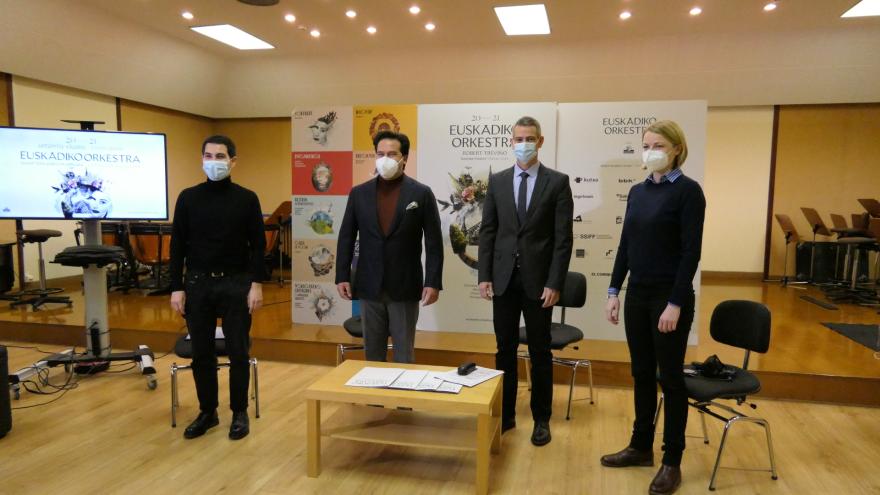
The Basque National Orchestra is tackling the second part of the concert season and is committed to carrying on and staying connected with its audience, despite the immense organisational effort involved.
The schedule through to June has been redesigned to adapt to new times, programmes and circumstances. Rather than the standard 50 concerts, this season will have a total of 100 to ensure all season ticket holders and the general public can attend. Tickets are still available for some performances.
Since the concert season got under way in September, the Basque National Orchestra has had to accommodate the strict measures dictated by the authorities to combat the COVID-19 pandemic. Among said measures, occupancy of its concert halls is currently limited to 400 people. The Basque National Orchestra has decided – with great effort involved – to increase the number of concert sessions from 5 to 12 so that its season ticket holders and followers can attend. It has also had to redesign some of its programmes. This has of course affected season ticket holders — with each new restriction on occupancy, times or movement between municipalities, they have had to reorganise themselves.
In the words of the orchestra's General Manager, Oriol Roch, “The result of this complex organisational labour is a highly ambitious path embarked upon by the Basque National Orchestra, rooted in its overarching commitment to the audience. Coupled to this is the orchestra’s conviction that it constitutes a great cultural asset and a driver of the society to which it owes its existence. The orchestra will, of course, continue its efforts. It’s worth it”.
Likewise, Robert Trevino says “Like any member of society, our shared purpose is to support and care for one another. The Basque National Orchestra has drawn on this concept of support to continue navigating the pandemic at the service of our society. Our goal is to stretch our bodies, our emotions and the very institution itself beyond limits bring music to people’s hearts and offer us a shared community experience. We have taken all manner of actions to make this possible – repeating programmes, rebroadcasting all our concerts on EITB, uploading these videos to YouTube, etc. – all so that every individual can experience the orchestra however they can”.
The programme for the coming months through to June sticks to some of the original plans while others have been modified. Among those plans going ahead are the debuts of three orchestral conductors (Ruth Reinhardt, Gemma New and Anja Bihlmaier), the premiere of the second work in the Elkano: Mundubira musika bidelagun project, titled My Marine Monsters, by Mikel Urquiza (Bilbao), and appearances by important soloists such as Vadim Gluzman on violin and Nikolai Lugansky on piano. The programme modifications include the unfortunate withdrawal of two choirs (Easo Abesbatza and Orfeón Pamplonés) from two programmes and of a selection of symphonies requiring a large ensemble. These measures have been taken to ensure that the safety distances currently required by law are maintained on the stage. Among the most exciting news is that the orchestra will be joined by a new soloist, Augustin Hadelich (scheduled for last season’s programme), and by pianist Judith Jáuregui and conductor Semyon Bychkov. Augustin Hadelich will not perform in Pamplona due to scheduling conflicts, while Judith Jáuregui and Semyon Bychkov will perform solely in the Navarran capital to make up for concerts cancelled in the city in Autumn. The biggest change in the concert pieces concerns the programme dedicated to Mahler, whose Symphony No.7, ‘Song of the Night’ will be substituted by symphonies 5 and 6 by Bruckner. By removing some works from the programme, we can accommodate others requiring smaller ensembles or which are of shorter duration, to ensure we comply with the restrictions.
The orchestra is striving to bring a quality programme to as many people as possible under the current circumstances. The Basque National Orchestra asks its audience for patience and understanding in the midst of the ongoing changes mandated by the restrictions in force at any given time, and which directly impact its concerts.
Current concert times:
- Donostia-San Sebastián and Vitoria: 17:30 and 19:30.
- Bilbao: 17:00 and 19:30.
- Pamplona: 18:00 and 20:15.
Concert season programme through to June
SURVIVORS:
Each city will enjoy a different combination of pieces. Back on the programme is Elkano: Mundubira musika bidelagun and the premiere of My Marine Monsters by Mikel Urquiza from Bilbao. Grammy winner Augustin Hadelich makes his debut with the orchestra (San Sebastián, Bilbao and Vitoria) with the well-known and beautiful Violin Concerto by Sibelius. Pamplona will hear pieces by Smetana and Brahms in lieu of the Sibelius concerto. All the performances will close with Dvořák's Symphony No. 5. The orchestra will be led for the first time by the young German conductor Ruth Reinhardt.
ENIGMATIKOA (Pamplona only):
Judith Jáuregui, pianist from Donostia-San Sebastián, and Jaume Santonja, Associate Conductor of the Basque National Orchestra, have put together a new programme to substitute one of the concerts cancelled in Pamplona. The pianist will perform Beethoven's Piano Concerto No.1, while the second part of the concert will be dedicated to Schumann's Symphony No.2.
MAHLER (Pamplona only):
Semyon Bychkov will conduct Mahler’s Symphony No.4 in Pamplona on 5th March. The conductor made his debut with the orchestra in the last edition of Musical Fortnight and now returns to Miramón. The work he is preparing with the orchestra will also be performed on 6th March at the Musika-Música festival in the Euskalduna Palace, Bilbao. Serena Saenz will perform soprano.
JOURNEYS:
Gemma New picks up the baton in this programme. The great Vadim Gluzman will perform solo violin in Prokofiev’s Violin Concerto No.2 before the orchestra tackles Schumann's Symphony No.3, ‘Rhenish’.
WAGNER (Pamplona only):
This programme was performed in November in Vitoria, San Sebastián and Bilbao and now comes to Pamplona, this time conducted by Jaume Santonja, Associate Conductor of the Basque National Orchestra. The orchestra will once again be joined by the mezzo-soprano Rinat Shaham.
BRUCKNER:
Robert Trevino returns to the podium to lead symphonies 5 and 6 by Bruckner.
YOUNG PEOPLE:
This programme features veteran conductor Hans Graf and Birgit Kolar, guest first violinist who makes her soloist debut with a performance of Bartok's Violin Concerto No.1.
WAYFARER:
Anja Bihlmaier is the third conductor to debut with the orchestra this season. She is joined by Manuel Walser, who will sing Mahler’s Songs of a Wayfarer. Walser has been one of Vienna State Opera’s brightest stars in recent years.
NEW YORK:
The final programme of the season will feature Rachmaninoff and his Rhapsody on the Theme of Paganini. The score requires an extraordinarily gifted pianist. Trevino has invited the great Russian virtuoso Nikolai Lugansky to take on the challenge, given his depth of knowledge of Rachmaninoff's music.
Season tickets and ticket sales
Ticket sales are subject to the restrictions in force at any given time. Sales will open shortly before each concert date. Due to the current circumstances, new season tickets are unfortunately not available. However, applications may be submitted for the next season.
Other orchestral activities
The Miramón Matinees cycle is going ahead with the 16 scheduled chamber music performances. Seats will be available to season ticket holders only and no further tickets will be sold while the occupancy restrictions remain in place.
The orchestra has made various commitments for the coming months with other cultural institutions. It will feature at Musika/Música in Bilbao (planned for early March), conducted by Semyon Bychkov, and at the BBVA Foundation Frontiers of Knowledge Awards in mid-June. The two ABAO Bilbao Opera programmes in which the orchestra was due to participate have been cancelled, as has the Musikaste festival in Errenteria.
The Basque National Orchestra takes the stage on American television
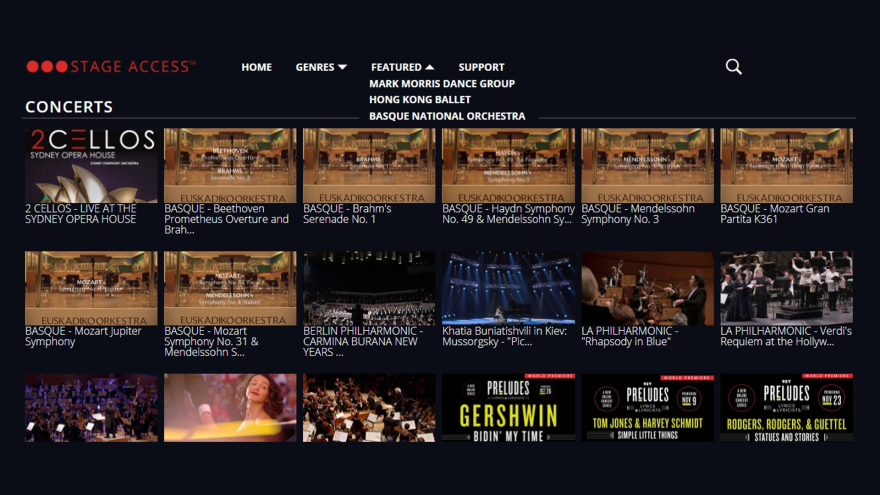
The eight concerts that were part of the ‘Euskadiko Orkestra Martxan!’ mini-season broadcast after the confinement of the first covid-19 wave are available on the American digital platform Stage Access, sharing the bill with renowned performers and ensembles from around the world.
The Basque National Orchestra is present on the new art streaming service Stage Access, a recently-launched digital subscription platform that includes concerts, opera, dance and theatre. As can be seen in the screenshot of the home page accompanying this article, the Basque National Orchestra will be sharing a space with highly relevant performers and ensembles such as Katia Buniatishvili, Lang Lang, the Berlin Philharmonic or the Vienna Philharmonic.
The platform has already made available to its subscribers the concerts that were part of 'Euskadiko Orkestra Martxan!', an initiative that saw the return of the Basque National Orchestra to the stage after the first wave and confinement of the covid-19 pandemic. The Basque National Orchestra was the first orchestra in Spain and one of the few in Europe to get started and reunite on the stage again, which raised the interest of Stage Access in the Basque ensemble. On that occasion, a reduced orchestra format was considered (maximum of 50 musicians), which met behind closed doors to create a mini-season of 8 concerts, first broadcast on ETB2 and later on the orchestra’s YouTube channel, where they received more than 10,000 views.
Now this mini-season which includes works by Mozart, Mendelssohn and Brahms among others, and which was directed in its entirety by Robert Treviño, is also available on Stage Access (only available for now for residents in North America). This partnership will bring the Basque National Orchestra to the North American market.
More information
Stage AccessStarting from today the Basque National Orchestra launches on YouTube its concerts from the 20/21 Season
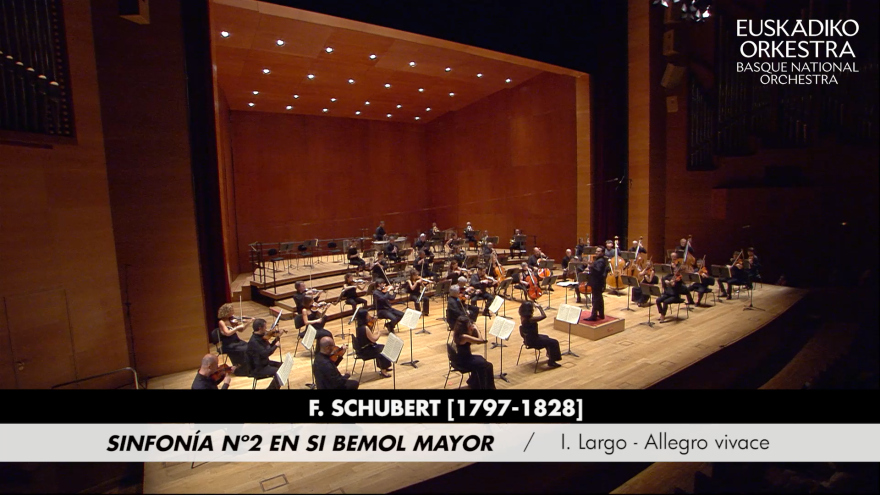
Today the Basque National Orchestra begins with Schubert's 'Symphony No. 2' the publication on its YouTube channel of the pieces that it is performing during its 20/21 Season. These are concerts recorded by ETB and which are also being broadcast on ETB2.
As we announced a few weeks ago, as a formula to overcome the current difficulty to perform before live audiences, the Basque National Orchestra has teamed up with EiTB to record and broadcast its Seasonal concerts, all of them recorded at the Euskalduna Conference Centre and Concert Hall in Bilbao. Since 28 November ETB2 has been broadcasting these concerts every Saturday at 11:00, and will continue to do so until July 2021, until the sequence has been completed.
After these broadcasts, the Basque National Orchestra will make available to the public the performance of these concerts on its YouTube channel, and will start to do so today with the publication of Franz Schubert's 'Symphony No. 2', the first of this renowned composer's four symphonies which the orchestra will make public over the coming weeks.
The Basque National Orchestra will gradually announce the uploading of new YouTube videos via its Facebook, Twitter and Instagram accounts.
Since the beginning of the lockdown in March, the orchestra has made great strides in producing and distributing quality audiovisual content in the digital space, and now has 7,000 subscribers to its YouTube channel.
More information
The Basque National Orchestra's YouTube channelThe Basque National Orchestra will present their 2020/2021 Season's concerts on ETB and their YouTube channel starting this Saturday
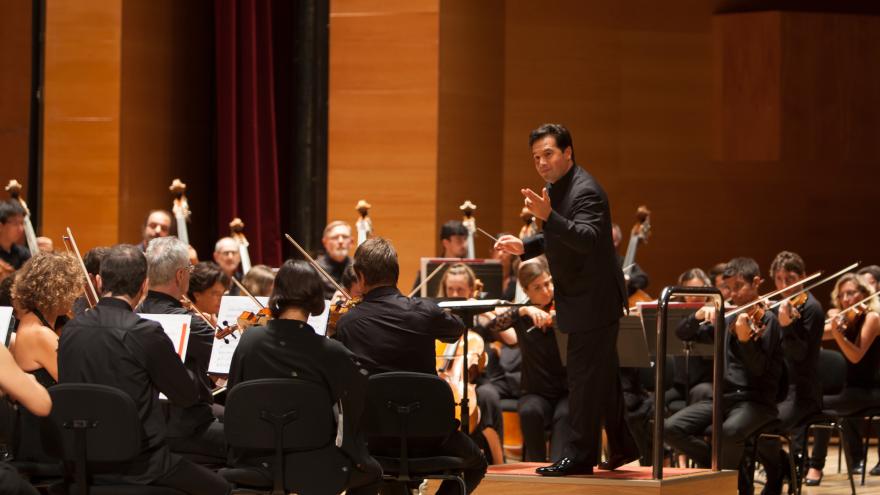
ETB2 will broadcast the performances every Saturday at 11:00 starting 28 November through July 2021.
As performances are broadcast on television, the Basque National Orchestra will make the pieces performed in these concerts available to the public on their YouTube channel.
As a way of overcoming the current difficulty of reaching in-person audiences, the Basque National Orchestra is once again joining forces with EiTB, this time to record and broadcast this Season’s concerts. Starting this Saturday, 28 November at 11:00, and on the following Saturdays through July 2021, ETB2 will broadcast all of the concerts that the Basque National Orchestra will present this Season at Euskalduna Bilbao.
This new series of broadcasts will add to the list of those that the Basque National Orchestra and EiTB already presented between May and July of this year under the title ‘Euskadiko Orkestra Martxan!’. This initiative constituted the Basque National Orchestra’s return to the stage after the first wave of the Covid-19 pandemic and subsequent lockdown (it was the first State orchestra, and one of the few in Europe to regroup and return to the stage). On that occasion, a reduced orchestra format was considered (maximum of 50 musicians), which met behind closed doors to create a mini-season of 8 concerts, first broadcast on ETB2 and later on the orchestra’s YouTube channel, where they received more than 10,000 views.
Now the Season’s own concerts are able to be presented in most auditoriums with a reduced audience due to current restrictions, while they will be recorded for broadcast on ETB2 and YouTube.
Calendar of ETB2 broadcasts
Thirteen concerts are planned for broadcast, all of which recorded at Euskalduna Bilbao. ETB2 will broadcast the performances every Saturday at 11:00 starting 28 November through July 2021, with the sole exception of the Christmas Concert, which will air on Friday, 25 December:
Date airing on ETB2 | Concert programme | Recorded at | Artists |
28 November (11:00) | Schubert (1) | 30 September, Euskalduna Bilbao | Robert Trevino (conductor) |
12 December (11:00) | Schubert (2) | 30 September, Euskalduna Bilbao | Robert Trevino (conductor) |
25 December (11:00), Christmas Concert | Enigmatikoa (1) | 9 December, Euskalduna Bilbao | Robert Trevino (conductor), Pablo Ferrández (cello) |
9 January (11:00) | Enigmatikoa (2) | 9 December, Euskalduna Bilbao | Robert Trevino (conductor), Pablo Ferrández (cello) |
23 January (11:00) | Wagner | 4 November, Euskalduna Bilbao | Michel Tabachnik (conductor), Rinat Shaham (mezzo-soprano) |
6 February (11:00) | Aire nordikoa (1) | 16 January, Euskalduna Bilbao | Robert Trevino (conductor) |
20 February (11:00) | Aire nordikoa (2) | 16 January, Euskalduna Bilbao | Robert Trevino (conductor) |
6 March (11:00) | Survivors | 3 February, Euskalduna Bilbao | Ruth Reinhardt (conductor) |
3 April (11:00) | The Journeys | 17 March, Euskalduna Bilbao | Gemma New (conductor), Vadim Gluzman (violin) |
1 May (11:00) | Bruckner | 10 April, Euskalduna Bilbao | Robert Trevino (conductor) |
29 May (11:00) | Youth | 5 May, Euskalduna Bilbao | Hans Graf (conductor), Birgit Kolar (violin) |
| |||
3 July (11:00) | New York | 16 June, Euskalduna Bilbao | Robert Trevino (conductor), Nikolai Lugansky (piano) |
These dates may change, and in particular those furthest off in the future. As the dates approach, they will be confirmed on the euskadikoorkestra.eus website and the Basque National Orchestra’s social media accounts.
Pieces available on YouTube
As the television performances are broadcast, the Basque National Orchestra will upload the concerts piece by piece to their YouTube channel.
Since the beginning of the lockdown in March, the orchestra has made great strides in producing and distributing quality audiovisual content in the digital space, and now has some 7,000 subscribers to its YouTube channel. This Season will take another step forward with the vast majority of its pieces performed being uploaded.
The Basque National Orchestra records the ‘Cello Concerto’ by Fernando Velázquez under his direction and with Johannes Moser as soloist
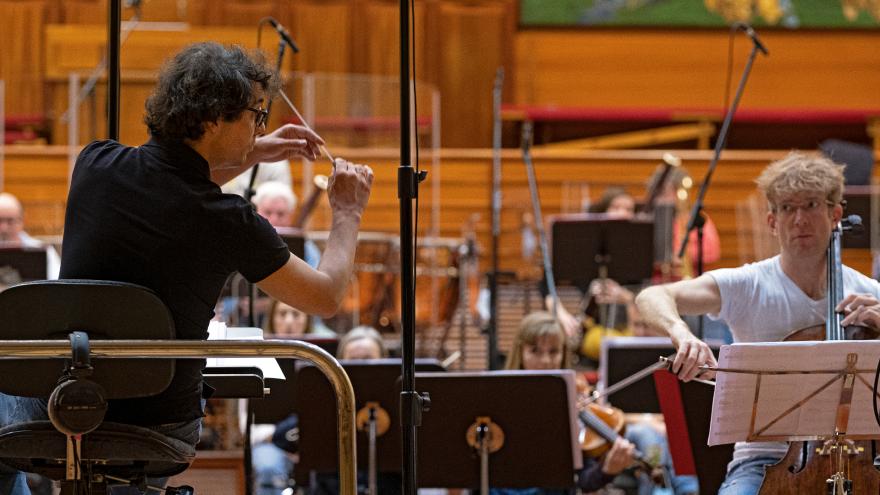
The conductor from Getxo, with whom the Basque National Orchestra enjoys frequent and fruitful collaborations, on this occasion focuses on recording his own independently created symphonic music.
The outstanding German-Canadian cellist Johannes Moser is the guest soloist in the recording with the Basque National Orchestra of this ‘Cello Concerto’ by Velázquez, which he conducts himself.
The prolific collaboration between the conductor Fernando Velázquez and the Basque National Orchestra continues to bear fruit this 20/21 season. Between April and July of this year, the videos in which Izaro and Huntza took the leap into the world of symphonic music in the company of the Basque National Orchestra and Fernando Velázquez were released, videos that have amassed more than a million views. At the end of September we announced that the orchestra and Velázquez would be attending the San Sebastian Festival for the presentation of Patria and Hil kanpaiak, whose soundtracks were composed by this productive duo.
In this first part of the season, Velázquez and the Basque National Orchestra have joined forces again to make a series of important recordings that will be released later at different times. Notable among these is the recording of the ‘Cello Concerto’ that Velázquez himself has composed and which will feature the soloist Johannes Moser. The renowned German-Canadian cellist, who was a guest of the Basque National Orchestra in the 2011 and 2014 seasons, is currently in San Sebastian to undertake this recording with the orchestra in the Miramon Auditorium.
Fernando Velázquez, composer, cellist and conductor
Although most of his work involves the composing of music for films, television series and musical arrangements for singers and musical groups, on this occasion Fernando Velázquez reveals his facet as a composer working independently, not constrained by filmed images but giving complete freedom to his creative talents.
Now Fernando Velázquez presents himself as composer of the Cello Concerto, a 26-minute piece whose solo instrument he is more than familiar with as a result of his training and career as a cellist. In this recording, Velázquez occupies the roles of composer, musician and conductor.
Johannes Moser, a world-class cellist
Hailed by Gramophone magazine as ‘one of the best among the astonishing gallery of young virtuoso cellists’, cellist Johannes Moser has performed with the world’s leading orchestras, including the Berlin Philharmonic, the New York Philharmonic, the Los Angeles Philharmonic, the Chicago Symphony, the BBC Philharmonic at the Proms, the London Symphony, Symphonieorchester des Bayerischen Rundfunks, Koninklijk Concertgebouworkest, Tonhalle Orchestra Zurich, the Tokyo NHK Symphony, the Philadelphia Orchestra and the Cleveland Orchestra, with top-tier conductors such as Riccardo Muti, Lorin Maazel, Mariss Jansons, Valeryin Gergievta, Vladimir Jurowski, Franz Welser-Möst, Christian Thielemann, Pierre Boulez, Paavo Jarvi, Semyon Bychkov, Yannick Nézet-Séguin and Gustavo Dudamel.
Fernando Velázquez and the Basque National Orchestra: a collaboration that goes back a number of years
The projects mentioned above are the most recent in which Fernando Velázquez and the Basque National Orchestra have collaborated, but there have been many others. Recently, in addition to Fernando Aramburu’s Patria, Velázquez and the orchestra have also recorded the original soundtrack for another novel brought to the screen: Soinujolearen semea, by Bernardo Atxaga. Also worthy of mention is the recent recovery of the music from Truffaut’s film The Bride Wore Black. But going a little further back we find A Monster Calls, a film directed by Juan Antonio Bayona, for which Velázquez won the Goya for best original music; Submergence, a feature film by Wim Wenders; the absolute premiere live performance of the soundtrack of The Impossible (J.A. Bayona), coinciding with its presentation at the San Sebastian Festival; Ocho apellidos vascos; Contratiempo; and others.
The renowned multi-award winning composer and conductor Fernando Velázquez is the leading exponent in a new generation of composers of music for film and television in Spain and the USA. His extensive career, which began in 1999, encompasses more than 50 feature films and national and international series, in addition to an important catalogue of concert works, incidental theatre music and commissions from all kinds of artists.
